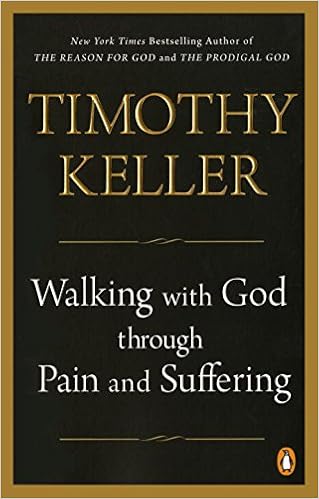 The ancient Greek philosopher Epicurus provocatively asked, “Is [God] willing to prevent evil but not able? Then he is impotent. Is he able but not willing? Then he is malevolent. Is he both able and willing? Whence then is evil?” (p. 85).
The ancient Greek philosopher Epicurus provocatively asked, “Is [God] willing to prevent evil but not able? Then he is impotent. Is he able but not willing? Then he is malevolent. Is he both able and willing? Whence then is evil?” (p. 85).
This is called “the argument against God from evil”. It was often raised to disprove God’s existence. Now a weaker claim is made: “suffering is not proof but evidence that makes the existence of God less probable, although not impossible” (p. 89). In any case, the problem of evil and suffering in the world drives many to question–and in some cases, outright reject–God’s existence.
Why does God allow evil? Attempted answers are called “theodicies”. One theodicy is “soul-making”. “This view says that the evils of life can be justified if we recognize that the world was primarily created to be a place where people find God and grow spiritually into all they were designed to be” (p. 89). This “answer” has two weaknesses. One, many people with “bad souls” get little adversity while many with “good souls” get a lot. Two, this view doesn’t explain why little children, infants or even animals suffer.
A second attempted answer is “the free will” theodicy. Keller defines it: “God created us not to be robots or animals of instinct but free rational agents with the ability to choose and therefore to love. But if God was able to make us choose the good freely, then he had to make us capable of also choosing evil. So our free will can be abused and that is the reason for evil” (p. 90,91). This theodicy also has weaknesses. For one, it may explain evil that people do (moral evil) but doesn’t explain disasters and disease (natural evil). For another, why couldn’t the all-powerful, sovereign God create humans capable of love but not such horrendous, suffering-causing evil?
Another (among many others) is the “punishment” theodicy. It holds that because humanity rebelled against God in the beginning, all suffering is punishment for sin. The randomness of suffering, however, makes this theodicy simplistic.
Theodicies such as these may help, but all fall short of satisfactorily explaining evil. Keller writes, “It is very hard to insist that any of them show convincingly how God would be fully justified in permitting all the evil we see in the world . . . Surely one of the messages [of the book of Job] . . . is that it is both futile and inappropriate to assume that any human mind could comprehend all the reasons God might have for any instance of pain and sorrow, let alone for all evil” (p.95).
Therefore, instead of trying to explain why God allows suffering, Christians recently have mounted a defense against the idea that the existence of evil doesn’t mean God must not exist. Keller: “If God has good reasons for allowing suffering and evil, then there is no contradiction between his existence and that of evil. So in order for his case not to fail, the skeptic would have to reply that God could not possibly have any such reasons. But it is very hard to prove that” (p. 97). And since God is omniscient, why couldn’t he have good reasons to allow even the worst suffering, reasons we can’t think of?
In a world of complex and far-reaching cause-and-effect, human knowledge is too limited to trace out all reasons and causes for suffering. Keller illustrates with “the butterfly effect”. Scientists have learned that large systems—like weather—can be influenced by the tiniest changes. “The classic example is the claim that a butterfly’s fluttering in China would be magnified through a ripple effect so as to determine the path of a hurricane in the South Pacific.”
What, Keller wonders, if every event in time had similar ripple effects. If so, “ . . . . how . . . could any human being look at the tragic, seemingly ‘senseless’ death of a young person and have any idea of what the effects in history will be?” (p. 100,101). We are simply not positioned to judge whether a particular evil is pointless and unnecessary.
The dynamic of all this intellectual reasoning fades in the face of what Keller calls the “visceral argument from evil.” “Visceral” refers to deep inward feelings rather than the ideas of the intellect. In his book, Night, Eli Weisel confesses how the fires of the furnaces in the Nazi death camp destroyed his faith in God. “Never shall I forget those flames which consumed my faith forever . . . Never shall I forget those moments which murdered my God and my soul and turned my dreams to dusts” (p. 102).
Of course, not everyone who endures horrendous evil rejects God. Keller argues that those who do reject God assume “that God, if he exists, has failed to do the right thing, that he has violated a moral standard”. But, if God doesn’t exist, from where comes such strong moral feelings?
Some might claim those moral feelings are the genetic product of evolution. Keller replies, “While that explanation may account for mere feelings, it can’t account for moral obligation. What right have you to tell people they are obligated to stop certain behaviors if their feelings tell them those [behaviors] are right . . . ? (p. 104).
C.S. Lewis wrote, “In a word, unless we allow ultimate reality to be moral, we cannot morally condemn [something as evil]” (p. 105), The moral God is the source of moral feeling and obligation!
In the throes of suffering we might shake our fist at the heavens and deny God’s existence. But Keller concludes Chapter 4 this way: “So abandoning belief in God doesn’t help with the problem of suffering at all and, as we will see, it removes many resources for facing it” (p. 107).
Each chapter in Walking with God through Pain and Suffering (https://www.amazon.com/Walking-God-through-Pain-Suffering/dp/1594634408/ref=sr_1_1?s=books&ie=UTF8&qid=1485462207&sr=1-1&keywords=walking+with+god+through+pain+and+suffering+by+timothy
+keller) concludes with an appropriate “Life Story. This one is “Mary’s.”
Throughout her young adult years, Mary suffered beating, sexual abuse, severe health problems, a schizophrenic child and financial ruin. Her words are an inspiring climax to a chapter about “the argument against God from evil” and offer a wise, humble response to evil . . .
“What I discovered about heartaches and problems, especially the ones that are way beyond what we can handle, is that maybe those are the problems [God] does permit precisely because we cannot handle them or the pain and anxiety they cause. But He can. I think He wants us to realize that trusting Him to handle these situations is actually a gift. His gift of peace to us in the midst of the craziness. Problems don’t disappear and life continues, but He replaces the sting of those heartaches with hope . . . ” (p. 108,109).
O God, to us who suffer so deeply that we sometimes doubt your existence and for whom the intellectual reasons don’t remove the visceral pain, give Mary’s realization that trusting You to handle the situation is actually Your gift of peace and hope. We are not intellectual giants, Father. We’re just Your hurting children who need Your gracious gift. In Jesus’ name. Amen.



 Our younger daughter posted this on Facebook today. It’s well worth reading. I’ll comment after . . .
Our younger daughter posted this on Facebook today. It’s well worth reading. I’ll comment after . . .

 A bit of overkill that title, huh? Diminishing life? I took it from Walter Wangerin’s book, Letters from the Land of Cancer. Though my health condition is far easier to bear than his, “diminishing” fits me too.
A bit of overkill that title, huh? Diminishing life? I took it from Walter Wangerin’s book, Letters from the Land of Cancer. Though my health condition is far easier to bear than his, “diminishing” fits me too.


 Since I’ve been diagnosed with Primary Lateral Sclerosis, the devil has been craving my faith (1 Peter 5:8,9). Days have dawned when I’ve doubted God. Doubted his goodness. Doubted his love. Doubted even his existence. (Thankfully, that’s rare.)
Since I’ve been diagnosed with Primary Lateral Sclerosis, the devil has been craving my faith (1 Peter 5:8,9). Days have dawned when I’ve doubted God. Doubted his goodness. Doubted his love. Doubted even his existence. (Thankfully, that’s rare.)
Recent Comments